


Tingling in the left hand can be concerning, and it’s important to understand what it might mean for your health. This sensation could be linked to heart attack risks, serving as a potential warning sign. When accompanied by other symptoms such as chest pain or shortness of breath, it becomes even more critical to pay attention.
Recognizing these signs can be the first step towards ensuring your well-being. If you experience tingling along with these symptoms, it’s essential to seek medical evaluation promptly. This proactive approach can lead to better outcomes and peace of mind.
Remember, you are not alone in this. Many people share similar concerns, and reaching out for help is a sign of strength. Your health is valuable, and taking action can make a significant difference in your life. Always prioritize your well-being and don’t hesitate to consult with a healthcare professional.
Tingling sensations in the left hand can often be more than just a minor annoyance; they may signal a serious underlying health issue, particularly when linked to heart attack symptoms. It’s essential to understand the various causes of this unsettling feeling, as it can provide insights into your cardiovascular health and potential risks. With conditions ranging from peripheral artery disease to diabetic neuropathy, recognizing the signs and knowing when to seek help can truly be life-saving.
What should you be aware of when you experience these sensations? How can you differentiate between benign and critical symptoms? These questions are important, and addressing them can help you feel more secure in managing your health. Remember, you are not alone in this; understanding your body is the first step towards taking care of it. If you ever feel uncertain, reaching out for support is a wise choice.
At Amavita Heart and Vascular Health, guided by the compassionate expertise of Harvard-trained Dr. Pedro Martinez-Clark, we are dedicated to providing comprehensive cardiovascular care tailored to the unique needs of older individuals. We understand that facing health issues can be daunting, which is why our clinic focuses on advanced therapies for conditions such as coronary artery disease, valve disorders, and arrhythmias. If you are experiencing symptoms like tingling in left hand heart attack, rest assured that you will receive meticulous evaluations and personalized treatment plans designed with your comfort in mind.
Dr. Martinez-Clark emphasizes the importance of innovative methods in our care, stating, "Advanced cardiac treatments not only boost survival rates but also enhance the quality of life for those under our care." This commitment to client-focused care is evident in our modern outpatient facilities, allowing you to undergo advanced cardiovascular procedures and return home on the same day. This approach fosters a more comfortable experience, often leading to improved outcomes.
Furthermore, Amavita is actively involved in the Miami Initiative to Stop Amputations (MISA), showcasing our dedication to reducing unnecessary limb loss and promoting awareness of cardiovascular health. By prioritizing individualized care and integrating advancements in device therapy, we significantly impact cardiovascular health outcomes, creating a supportive environment where you feel valued and understood.
We invite you to reach out and explore how we can support your health journey together.
Tingling in the left hand heart attack can serve as an important warning sign of a cardiac event, especially when it occurs alongside other symptoms such as chest pain, shortness of breath, or discomfort radiating to the arm. During a cardiac event, the blockage of blood flow to the heart can lead to nerve damage, resulting in sensations of prickling or numbness in the limbs. This issue is often associated with poor circulation due to blocked arteries, which can deprive peripheral nerves of vital oxygen.
At Amavita Heart and Vascular Health®, we understand how concerning these symptoms can be. We emphasize the importance of thorough cardiac evaluations for individuals experiencing such signs. Risk factors such as family history, high blood pressure, elevated cholesterol, and diabetes can significantly increase the chances of a cardiac event, making it crucial to be aware of subtle signs, including tingling in left hand heart attack. Our preventive cardiology approach combines advanced risk assessment tools with personalized interventions, ensuring that patients receive tailored strategies to effectively reduce their risk of an attack. Recent studies indicate that over 20 percent of heart attacks are classified as 'silent,' showing little to no symptoms. Experts highlight the urgency of recognizing these signs; seeking prompt medical attention can greatly improve outcomes. For instance, the American Heart Association advises calling 911 immediately when experiencing these symptoms, as emergency medical technicians are trained to respond swiftly to cardiac emergencies and provide essential care during transport to the hospital.
Real-life stories underscore the significance of recognizing these warning signs. In one case, a patient who felt a prickling sensation in their left arm, accompanied by chest discomfort, sought help without delay and received life-saving treatment. Cardiologists emphasize that any new, severe, or unusual symptoms should never be overlooked, as they may signal serious heart-related issues. Understanding the connection between unusual sensations and heart attacks empowers individuals to act quickly, potentially saving lives. At Amavita, we are committed to enhancing cardiac care through our CardioElite™ program, which fosters proactive management of patients and reduces readmissions, ensuring that individuals receive the comprehensive care they truly deserve.
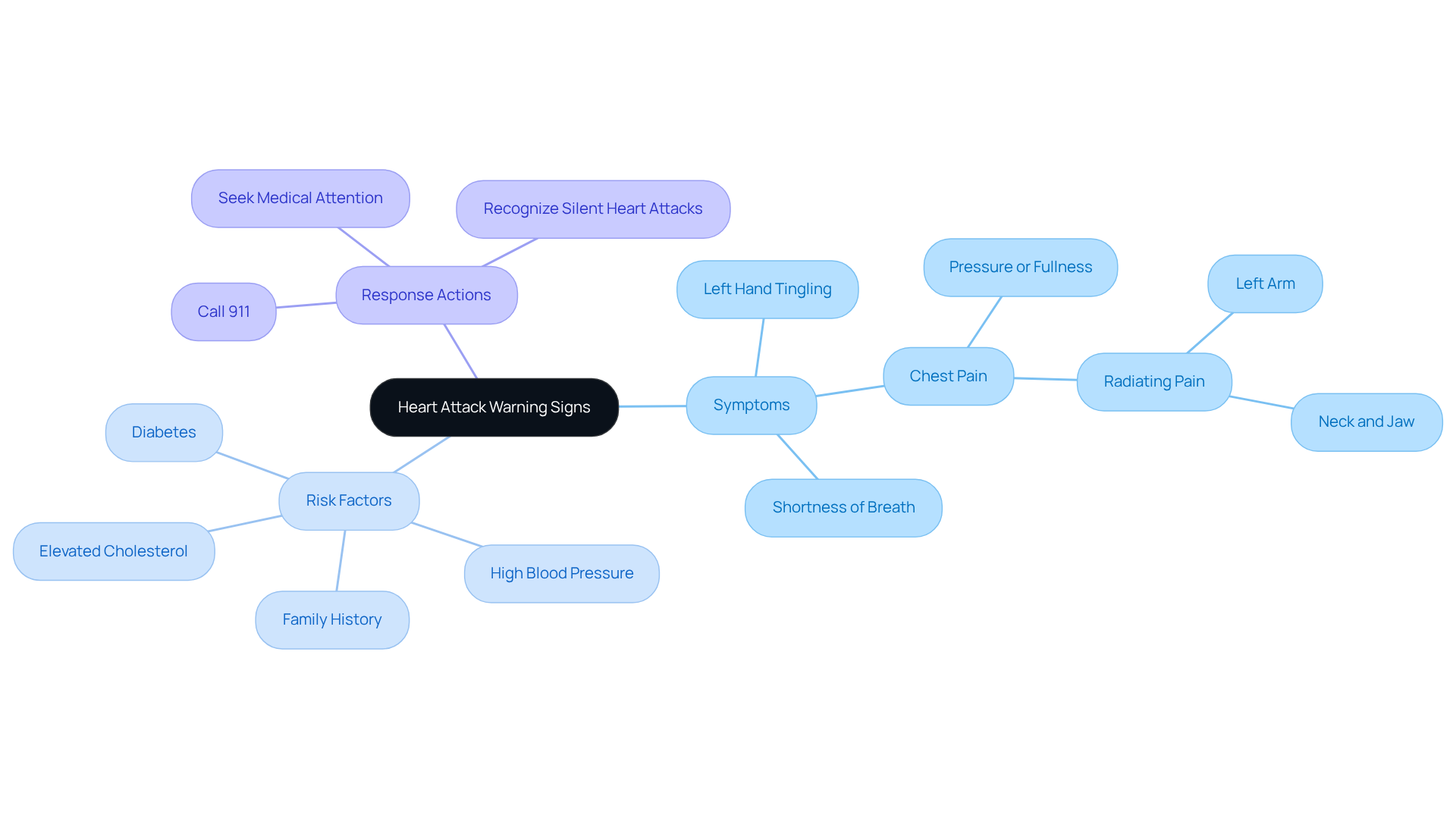
Peripheral artery disease (PAD) can be concerning, as it involves the narrowing or blockage of arteries, which significantly reduces blood flow to the limbs. This can lead to uncomfortable sensations such as tingling in the left hand, pain, or weakness, especially in areas like the left hand. For many older individuals, who often face multiple risk factors, these feelings can be especially troubling. It’s important to recognize that smoking, diabetes, high cholesterol, and a sedentary lifestyle are major contributors to PAD.
Did you know that approximately 6.5 million individuals aged 40 and older in the United States are affected by this condition? Its prevalence increases significantly with age, which can be alarming. Recent studies reveal that as many as 50% of individuals with PAD may not display any symptoms at all, making it crucial to be aware of your vascular health.
If you are experiencing a prickling sensation in your hands, please don’t hesitate to consult a healthcare provider. Assessing your vascular health is essential, and there are effective treatment options available. Real-life examples show that structured exercise therapy and advanced interventions can significantly improve symptoms and enhance the quality of life for patients with PAD. This highlights the importance of proactive management in reducing the risks associated with this condition. Remember, you are not alone in this journey, and there are caring professionals ready to support you.
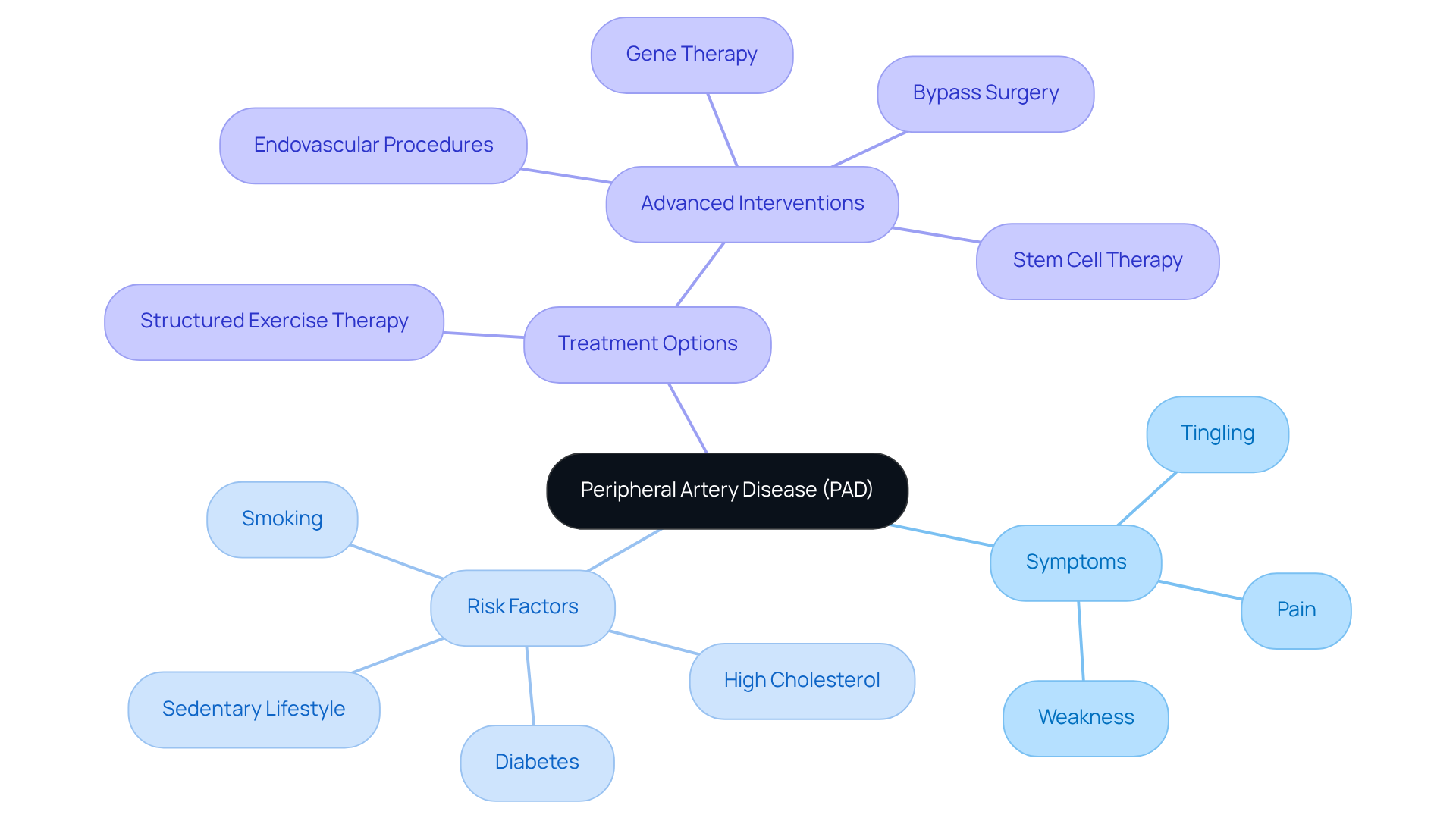
A pinched nerve occurs when surrounding tissues apply pressure on a nerve, resulting in sensations such as prickling, numbness, or pain. This condition can arise from various factors, including repetitive motions, poor posture, or injuries. If you’ve been experiencing tingling in left hand heart attack, you might be concerned about conditions like carpal tunnel syndrome or cervical radiculopathy.
Carpal tunnel syndrome, for instance, affects the median nerve at the wrist and can lead to significant discomfort, especially in the fingers. It’s important to know that current data indicates this condition affects approximately 1 in 20 people, with a notable 21% increase in cases among remote workers due to non-ergonomic work environments since the pandemic. If you find yourself in this situation, you’re not alone, and there are ways to find relief.
Treatment options typically encompass:
Neurologists emphasize the importance of early diagnosis and intervention, as timely treatment can prevent long-term complications and improve patient outcomes.
Chronic conditions such as diabetes and rheumatoid arthritis can also contribute to the development of carpal tunnel syndrome. It’s essential to address these underlying issues to promote your well-being. Making ergonomic modifications is crucial in preventing the emergence of problems and fostering a healthier work environment. Remember, taking these steps can lead to a more comfortable and fulfilling daily life.
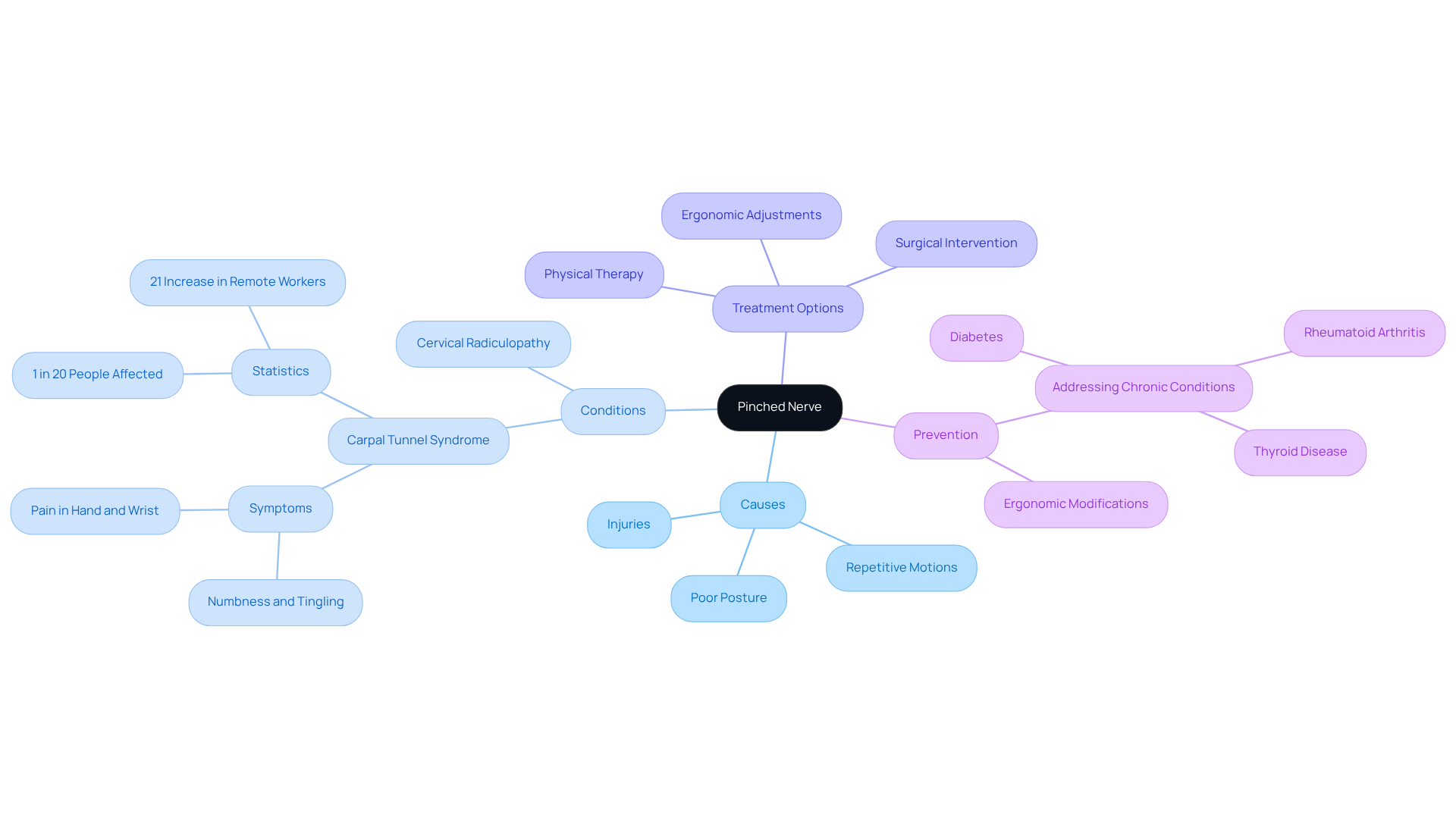
Multiple sclerosis (MS) is an autoimmune condition that significantly impacts the central nervous system, leading to various sensations such as prickling and numbness. When the immune system mistakenly attacks the myelin sheath—the protective covering of nerves—it disrupts the crucial communication between the brain and the body. This disruption can manifest as prickling sensations, particularly in the left hand, which may serve as an early indicator of the disease, especially in younger individuals.
In addition to this, research indicates that elderly patients may experience early signs like tingling, chronic pain, and mood changes, often years before a formal diagnosis. A thorough study examining health records of more than 96,000 people found that those who later developed MS were eight times more likely to report neurological issues in the five years leading up to their diagnosis. Furthermore, individuals who subsequently developed MS began utilizing healthcare services more frequently 14 years prior to the onset of their symptoms, highlighting the importance of early identification and the extended prodromal phase of this condition.
Experts emphasize the significance of recognizing these early signs. Helen Tremlett, a professor of neurology, notes that symptoms such as fatigue, headache, and pain can be easily confused with other conditions, making early detection more challenging. She states, "MS can be difficult to recognize as many of the earliest signs — like fatigue, headache, pain, and mental health concerns — can be quite general and easily mistaken for other conditions." If a prickling sensation persists or is accompanied by other neurological symptoms, it is crucial to seek evaluation from a healthcare professional. Neurological assessments, including MRI scans and nerve conduction studies, can help clarify the underlying causes of these sensations and determine if MS is a factor.
Understanding the connection between sensations and MS is essential for prompt intervention, as early diagnosis can greatly affect treatment outcomes and quality of life. If you or someone you know is experiencing ongoing sensations, it is advisable to consult a healthcare professional for further evaluation. Remember, you are not alone in this journey, and seeking help is a strong and important step towards understanding your health.
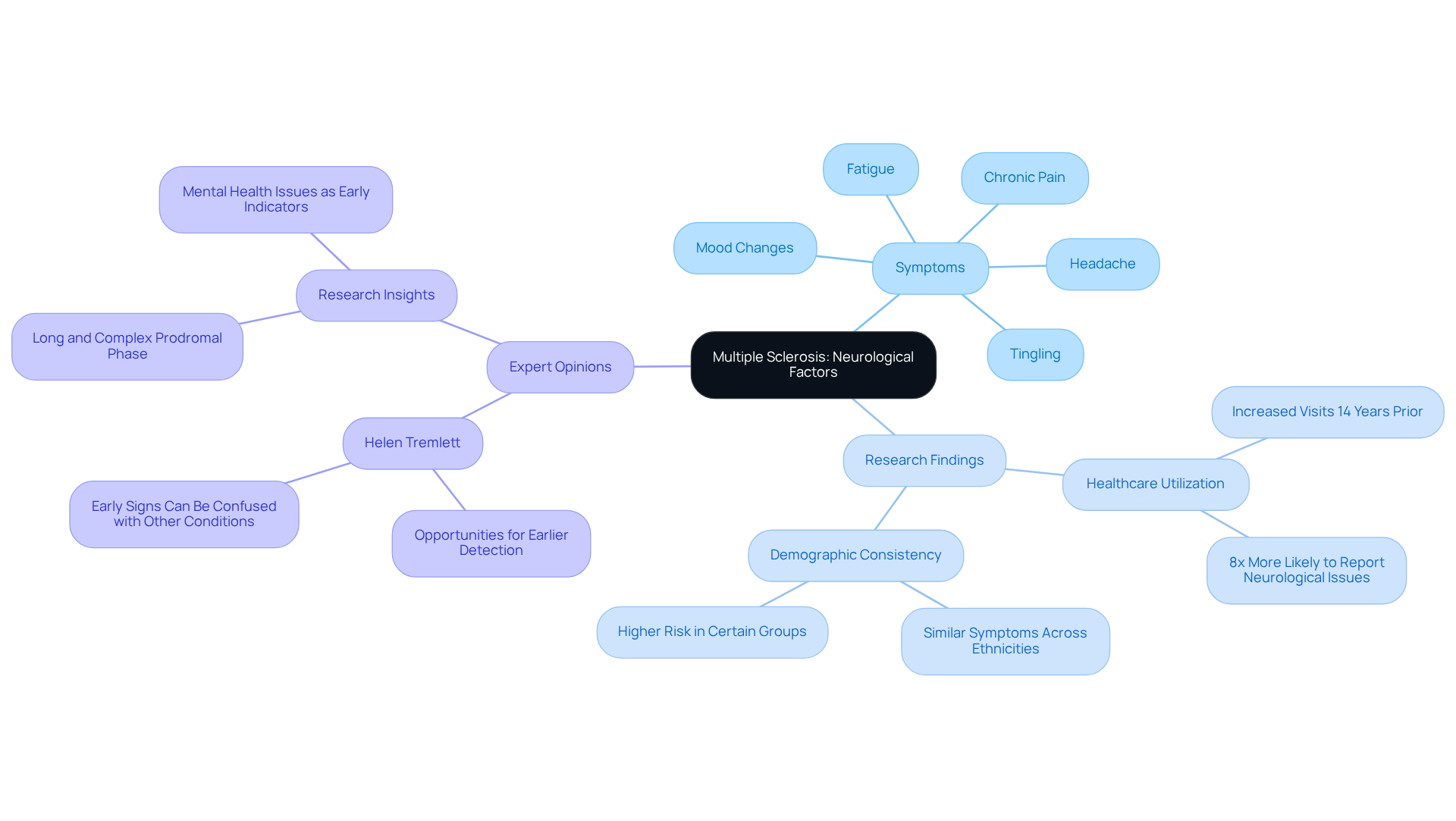
Diabetic neuropathy is a common complication of diabetes that can deeply affect your quality of life. This condition is characterized by nerve damage, often manifesting as symptoms like tingling in the left hand, numbness, or pain in your extremities. It’s important to understand that elevated blood sugar levels can lead to nerve deterioration over time, resulting in these distressing sensations. Did you know that nearly 50% of adults with diabetes may experience some form of neuropathy during their lifetime? This statistic underscores the critical need for effective diabetes management strategies to help you feel your best.
Dr. Caitlin W. Hicks shares insights on this issue, noting, "The prevalence of peripheral neuropathy is estimated to be between 6% and 51% among adults with diabetes depending on age, duration of diabetes, glucose control, and type 1 versus type 2 diabetes." To mitigate the risk of nerve damage, comprehensive diabetes management is essential. This includes maintaining optimal blood glucose levels through a combination of medication, a balanced diet, and regular monitoring. The American Diabetes Association emphasizes the importance of glycemic control and proper foot care in preventing and treating diabetic peripheral neuropathy.
Furthermore, endocrinologists stress that proactive management can significantly reduce the likelihood of developing neuropathy. For instance, aggressive glycemic control and routine foot exams are vital components of care that can prevent complications associated with diabetic neuropathy. Real-world examples illustrate the effectiveness of these strategies. The SENZA-PDN RCT outcomes showed that 86% of patients experienced substantial long-term relief, highlighting the positive impact of effective treatment options.
If you are experiencing tingling in the left hand, it’s crucial to consult your healthcare provider. Discussing your conditions and exploring personalized treatment options can ensure a proactive approach to your health and well-being. Remember, you are not alone in this journey, and seeking help is a strong step towards improving your quality of life.
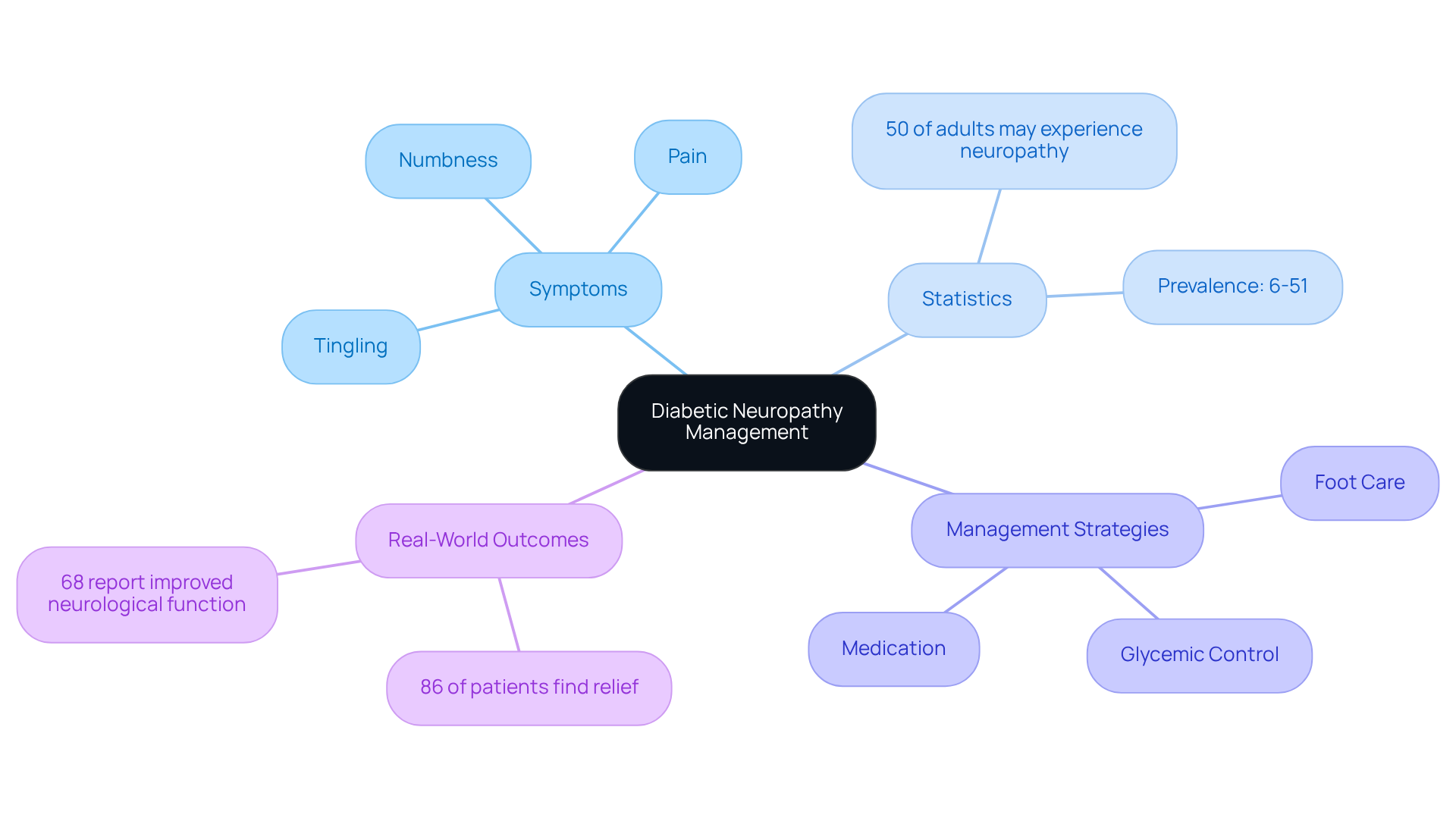
Identifying when sensations such as tingling in the left hand heart attack signal a serious medical concern is crucial for your well-being. If you experience symptoms such as:
along with tingling in left hand heart attack, it’s essential to seek prompt medical attention. These signs, such as tingling in left hand heart attack, may indicate a cardiac event or stroke, both of which require urgent care. For instance, most cardiac incidents involve discomfort in the center of the chest lasting more than a few minutes, and symptoms can also include pain or discomfort in one or both arms, the back, neck, jaw, or stomach. If you experience tingling in left hand heart attack symptoms that persist or worsen, please consult a healthcare provider for a thorough evaluation.
Emergency medicine specialists emphasize that if you suspect a heart attack or stroke, such as experiencing tingling in left hand heart attack, seeking help right away is vital, as every minute counts in these situations. Remember, every minute you delay calling 911 after a stroke results in the loss of more brain cells. Additionally, women may experience distinctive signs such as:
To quickly identify stroke symptoms, use the F.A.S.T. method:
Keeping an emergency information card handy can also serve as a practical reminder to seek help promptly.
It's important to be aware of risk factors such as family history, high blood pressure, high cholesterol, and diabetes, which can elevate your risk of an attack. At Amavita, our preventive cardiology approach focuses on reducing heart attack risk through personalized interventions, ensuring that you receive the targeted cardiovascular care you need. We are here to support you every step of the way.
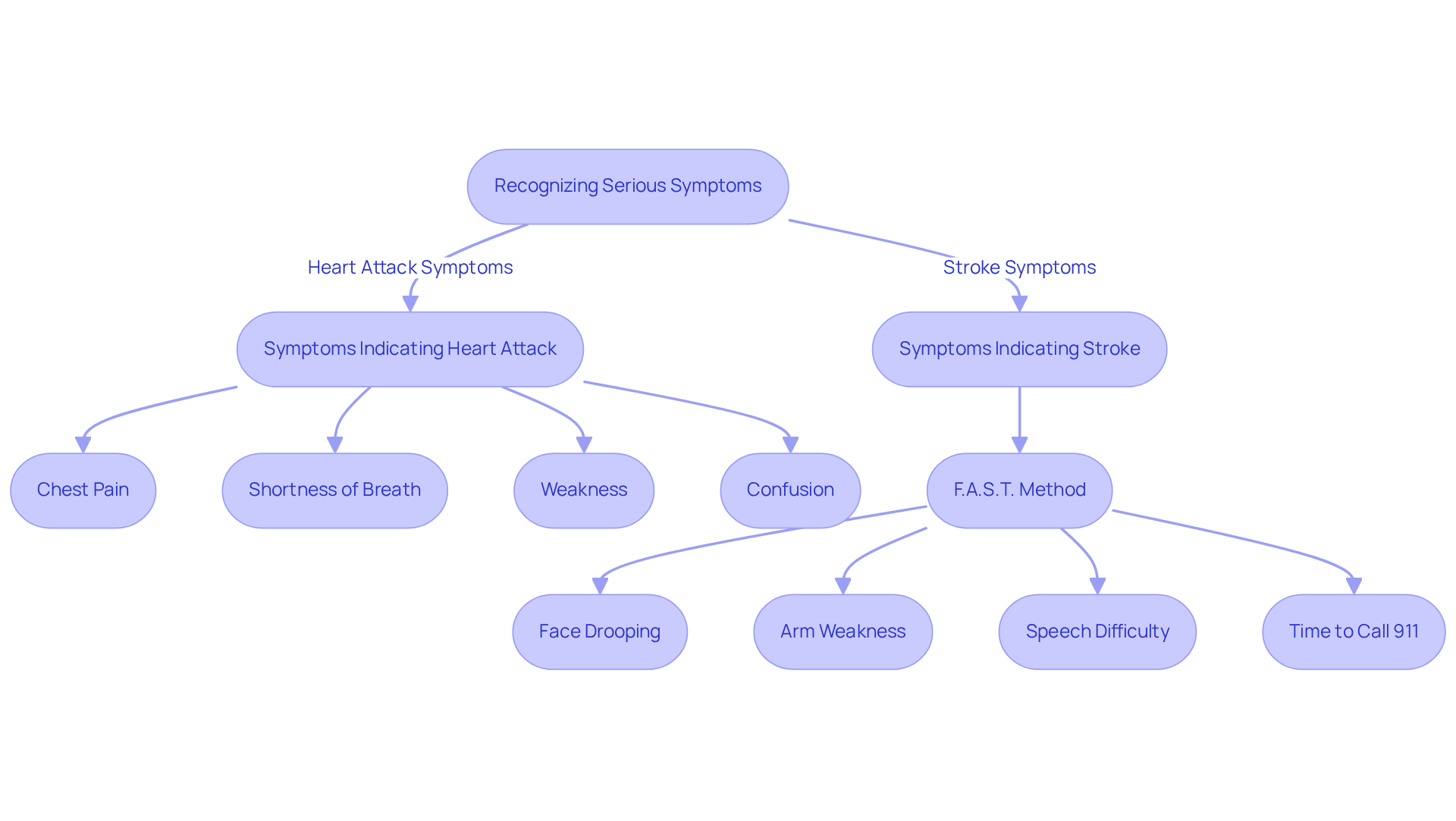
Tingling in the left hand can be a significant indicator of various health conditions, including heart-related issues. Understanding the potential causes—such as heart attacks, peripheral artery disease, pinched nerves, multiple sclerosis, and diabetic neuropathy—is crucial for timely intervention. Recognizing these symptoms and the associated risk factors empowers individuals to seek medical attention promptly, potentially saving lives.
This article highlights the critical importance of being vigilant about the signs and symptoms of serious conditions. From heart attacks that may present with discomfort and tingling to the subtle yet alarming signs of diabetic neuropathy, awareness and proactive management are key. Have you considered your health history and risk factors? It’s essential to consult healthcare professionals when experiencing unusual sensations, especially if accompanied by other concerning symptoms.
Ultimately, taking action at the first sign of tingling or discomfort in the left hand can lead to better health outcomes. By understanding the connections between these sensations and serious health issues, individuals can make informed decisions about their well-being. Seeking help and utilizing available resources, like those offered by Amavita Heart and Vascular Health, paves the way for effective management and improved quality of life. Prioritizing heart health and being proactive about symptoms can truly make a meaningful difference in your health journey.
What services does Amavita Heart and Vascular Health provide?
Amavita Heart and Vascular Health offers comprehensive cardiovascular care tailored to older individuals, focusing on advanced therapies for conditions such as coronary artery disease, valve disorders, and arrhythmias.
Who leads the care at Amavita Heart and Vascular Health?
The clinic is guided by Harvard-trained Dr. Pedro Martinez-Clark, who emphasizes innovative methods in patient care.
What should I do if I experience tingling in my left hand?
Tingling in the left hand can be a warning sign of a cardiac event, especially if accompanied by symptoms like chest pain or shortness of breath. It is crucial to seek prompt medical attention.
What are the risk factors for experiencing a cardiac event?
Risk factors include family history, high blood pressure, elevated cholesterol, and diabetes. Being aware of these factors can help in recognizing potential cardiac issues.
How does Amavita approach preventive cardiology?
Amavita combines advanced risk assessment tools with personalized interventions to reduce the risk of cardiac events, ensuring tailored strategies for each patient.
What is the significance of recognizing warning signs of a heart attack?
Recognizing symptoms like tingling in the left hand can lead to prompt medical attention, which greatly improves outcomes. Over 20 percent of heart attacks are classified as 'silent,' making awareness essential.
What emergency action should be taken if heart attack symptoms occur?
The American Heart Association advises calling 911 immediately if experiencing symptoms of a heart attack, as emergency medical technicians are trained to respond swiftly.
What is the CardioElite™ program at Amavita?
The CardioElite™ program at Amavita focuses on proactive management of patients and reducing readmissions, ensuring comprehensive care for individuals with cardiovascular concerns.
How does Amavita contribute to the community regarding cardiovascular health?
Amavita is involved in the Miami Initiative to Stop Amputations (MISA), promoting awareness of cardiovascular health and reducing unnecessary limb loss.